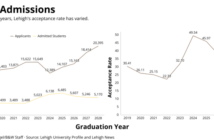
Jessica Hicks
The road to becoming a professional journalist is only getting more difficult, and my first semester at Lehigh gave me a taste of what that journey would look like.
One of my first classes started with a conversation about the death of print journalism. Wide-eyed and alarmed, I scribbled in my notebook unsure of what I had gotten myself into.
Surely journalism was still relevant if Lehigh offered an entire program dedicated to its practice, principles and ethics. But how would I find a job if print circulation was on the decline? My short-lived uncertainty subsided with later conversations about the growth of the digital landscape.
In the weeks that followed, I was met with criticism from peers who claimed they did not understand the appeal of the “College of Arts and Crafts” or the value in being a journalism major. They questioned my ability to do anything worthwhile with what they deemed a dying art. I didn’t listen.
I quickly became part of The Brown and White’s editorial staff and signed myself up for not one, but what would become six semesters-worth of early morning interviews and late nights in the newsroom.
I never questioned if there was value behind what I was doing — I knew there was. But it wasn’t until now that I realized how truly valuable it is to pursue journalism as both a passion and profession.
The press is a crossroads, a turning point, a critical moment — however you put it, journalists in the United States are confronted with criticism, incredulity and, in some unfortunate cases, violence when simply trying to do their jobs.
Some of the criticism is warranted. Misinformation and media bias are widespread problems that, if remain unaddressed, will continue to have a profound impact on the way the public perceives and interprets information. It is up to journalists to change that, but their ability to do so is hindered when press freedoms are threatened.
Early last month, CNN reporter Jim Acosta was barred from the White House after refusing to relinquish the microphone in a heated press conference with President Donald Trump. What’s more, Sarah Huckabee Sanders, the White House press secretary, made false claims that Acosta placed his hands on the intern attempting to take the microphone from him.
While some might argue that Acosta instigated the suspension of his press credentials with his relentless questions, anyone who follows the Trump administration is familiar with the president’s disdain for any and every news publication that sheds light on his shortcomings and blatant disregard for the truth.
The American Civil Liberties Union responded perfectly to the incident in its statement that, “The White House belongs to the public, not the president, and the job of the press is to ask hard questions, not to be polite company.”
Additionally, anyone who watched the press conference could see that the video Sanders’ shared of the conference had been edited to make Acosta’s actions look more aggressive than they were in reality.
Trump loves to call credible news outlets “fake news,” meanwhile in September, The Washington Post’s fact checker found that Trump has made 5,000 false or misleading claims since the beginning of his presidency. The figure soared well above 6,000 by the end of October.
While I thought my journalism education and experiences on The Brown and White had given me a glimpse of the trials and tribulations of the press, I realize I have a lot more to learn — especially in today’s political climate, with a leader who has made the press out to be the enemy of the people.
Little does Trump know, the press is for the people.
The journalist’s first obligation is to the truth, and sharing that truth with the public. The Society of Professional Journalist’s Code of Ethics specifies that journalists must be “honest and courageous in gathering, reporting and interpreting information.”
There needs to be a greater emphasis on veracity rather than viewership. While gaining and maintaining readership is of utmost importance for spreading ideas and bringing in revenue for their publications, journalists need to return to their focus on thorough reporting rather than virality or sensationalism.
It is important to renew that focus now more than ever.
Although trust in the media is beginning to recover since its all-time low in 2016, we can still do better. It is not only the journalist’s responsibility to ensure the free exchange of information in our democracy is accurate and just, but it is also our duty to fight for that exchange of information to exist in the first place.
Trump has undoubtedly made the fight harder. Under his leadership, there are fewer formal news conferences and White House briefings. He makes fun of reporters with disabilities and even tells some that their questions are stupid.
In some ways, the press will always be under attack. Since it is our duty to serve as watchdogs of power, some people — especially those who have and seek that power — will always find fault with what we do, write and say. Pursuing the truth is a difficult task, but it is one we can’t abandon.
If my countless hours in the newsroom have taught me anything, it isn’t to give up — it’s to go forth and journalism.
_
Jessica Hicks, ’19, is the Editor in Chief for The Brown and White. She can be reached at [email protected].





Comment policy
Comments posted to The Brown and White website are reviewed by a moderator before being approved. Incendiary speech or harassing language, including comments targeted at individuals, may be deemed unacceptable and not published. Spam and other soliciting will also be declined.
The Brown and White also reserves the right to not publish entirely anonymous comments.
3 Comments
It’s weirdly heartening to hear a young person surprised by the demise of print, which we started talking about, oh, 30 years ago, and figured we’d had the last rounds at the wake for maybe ten years ago. Then again, I guess my kid was disappointed that she couldn’t have a “real” newspaper subscription, paper and all: the only national paper that delivers paper out here is the Journal, and even a kid knows better than to go for that. Otherwise you’re left with the local tentacle of the Gannett cephalopod, and the student paper, which is better than the Gannett rag but still a student paper. And she’s too young for a NYRB sub.
Print isn’t dead because nobody wants it; print is dead (for news, not books) because it’s tremendously expensive and dirty (though, if you haven’t got metallic inks, it’s nice in compost). But it doesn’t really matter. What matters is that the word gets out, one way or another. J-schools are coming off at least 25 years’ worth of being friends to the powerful, being pussycats who get nice dinner-party invitations. It’s nice to hear young journalists waking up.
May I point something out, though, Jessica? In no form does journalism pay serious money. PR pays money, though that’s another thing entirely. And there you are at a $67K/yr school — for undergrad – that isn’t all that rich in journalism contacts. Your future ability to go forth and journalism will depend greatly on your ability to make no money. You can’t make no money if you’ve got massive student loans, you have to pay the loans, at least until a new generation is in power and willing to do something about these outrageous debts that have been forced on you guys. So unless your family’s very wealthy and likes you and your adventures lots, or someone else is paying your way there, I would suggest strongly you get yourself out of that situation and into one that costs you as close to $0 as possible for the rest of your education.
Because otherwise you really will wind up doing PR, and you’ll haaaate it. You know what a really successful PR person does? Gets very excited about neutralizing terrible press about some company or other poisoning people near and far. Or is devoted to the business of making rich people richer, whatever it takes.
Go forth and journalism, just do it smart. Don’t forget to read your Liebling, your IF Stone, your Martha Gellhorn, your Agee (especially your Agee), and your Isherwood.
Ahh, the drivel of Amy Charles strikes again!
Do you sit up at night (your comment is timestamped 1:30am) and wait to pick on the writings of people who are 40 years your junior because you feel that you are offering them insight that they couldn’t get somewhere else or because you are compensation for the inadequacies in your own life?
This piece never once mentioned the salary of journalists, the cost of attendance at Lehigh or a career in PR. However, sticking to your goal of being the most negative presence in any comment thread you dragged all of these factors into a discussion on the necessity of journalists in a democratic society.Perhaps you brought up the ability to make money because of your frustration with making far below the median income in Iowa (as a state employee this is public record), and possibly a guilt that you feel because “someone else is paying your way” in life? The comment section of a student newspaper isn’t a forum to make yourself feel better by putting others down — a lesson you clearly have yet to learn.
You stated that Ms.Hicks’ “future ability to go forth and journalism will depend greatly on [her] ability to make no money”; however, if you actually paid attention to the content of an article instead of just using the comment box as a vent for your frustration, you would see that her ability to go forth and journalism is only limited by her own drive to keep the public informed — a quality which she is clearly not lacking. As an international relations major you should remember that a free press is one of the important factors in a healthy state, yet you are belittling the efforts of a young adult to be part of such an important apparatus. Clearly, Lehigh failed you.
If you harbor such disdain towards student news papers, as your comments about The Daily Iowan imply, then I have a word of advice for you, stay off the Brown and White’s website, I’m sure the staff and readers would not miss your presence below seemingly every article.
Relax, I didn’t insult your friend or journalists. (Or the DI, which is an excellent and well-run student paper, but it’s not the Post, nor does it pretend to be.) Most working journalists who aren’t former rich kids would say the same thing. The ability to go forth and journalism requires an evangelical commitment, but it requires some other things, too.
If you’re a non-rich journalist, not supported by anyone else, and you find yourself with high overhead, like for instance a $500/mo student-loan payment on top of living expenses, you’re likely to find that within a few years you’re in corporate communications or some other job you really don’t want to be doing, but uses your training. $500/mo isn’t an enormously big deal if you’re walking out expecting upwards of $60K in a median-cost-of-living market, and looking at relatively stable employment. It’s a serious problem, though — potentially a dealbreaking problem — if you’re looking at $28-35K in a notoriously unstable industry. Or less, depending on how real you want your journalism to be, or whether you’re working salaried or as a gig-collector.
I know something about that problem — the problem of affording work that doesn’t pay much — because I’ve lived with it, mostly successfully, for three decades while watching generations of other artists and journalists without rich families figure it out in their own ways. And while watching many others, some not much older than undergrads, get forced out of the work they want to do because their lives are too expensive for it, frequently because of debt. Some manage for a while by burning the candle at both ends, but not too many people are equipped physically to do that for very long. The amounts under discussion are seldom huge — it’s just deficits of hundreds a month that add up over time, plus the odd sudden expense in the thousands. A car problem, a health problem, a baby. And one day the situation is recognized as untenable, and the dream evaporates. I’ve seen a couple of people spend years or decades lost in that gap between needing to do good work and not being able to afford to do it, and take their own lives.
Will is not enough, as it turns out. Health and the ability to endure — physically, mentally, emotionally — are also important, as are the numbers, and the recognition that if you’re going to do something that’s already hard, and you want to spend your life at it, you probably don’t want to collect more major obstacles than you have to. Like large student debt at a fancy school. If it’s a thing, and you can cut that significantly by going elsewhere, I would strongly recommend doing so, because it can affect your options for decades. I recognize that this is an infuriating thing to say, given that nearly everyone whose family isn’t rich has to take out serious loans to get through school now. Unfortunately, the reality is infuriating.
Good work on finding my salary; what you saw is probably wrong (these things should be easier to look up with accuracy), and it’s not my entire income. But no, my real salary is not a lot of money, and no, nobody else is supporting me. (Though again, I see no shame at all in accepting someone else’s help to do worthwhile things, so long as it’s not coercive.) In fact I support someone else, and I’ll send that someone else to college in not too long, and, one day, retire. Again, if you want to do work that doesn’t make money, and you didn’t come out of the chute rich, you have to be strategic. I live in a place where it’s possible to live pretty nicely on not much, especially if you already own property. Walkability, good healthcare, good public schools, nice amenities, vacations, summer camps, the whole vanishing-middle-class shebang. This kind of money in Boston or New York would have me sleeping on someone’s couch, but fortunately I don’t have to live in those places to do my work or bring up a child.
Lehigh’s culture has a weird thing going on about money, and it seems to fuel a lot of sourness and anger: it tells its people that if there isn’t money attached, it’s not worth doing, or that it’s somehow insulting to be told that there won’t be money, or embarrassing not to make much. And people get really angry at the idea that others wouldn’t income-maximize. It’s not necessary to think that way. But it is necessary to take the dollars seriously, because the dollars pay for the hours. And it’s the hours that are the point, assuming you have something you want to do with your life.
Finally, if you believe journalism is valuable, rethink telling people what or how much to say, and getting bent out of shape about when in the day and where they say it.